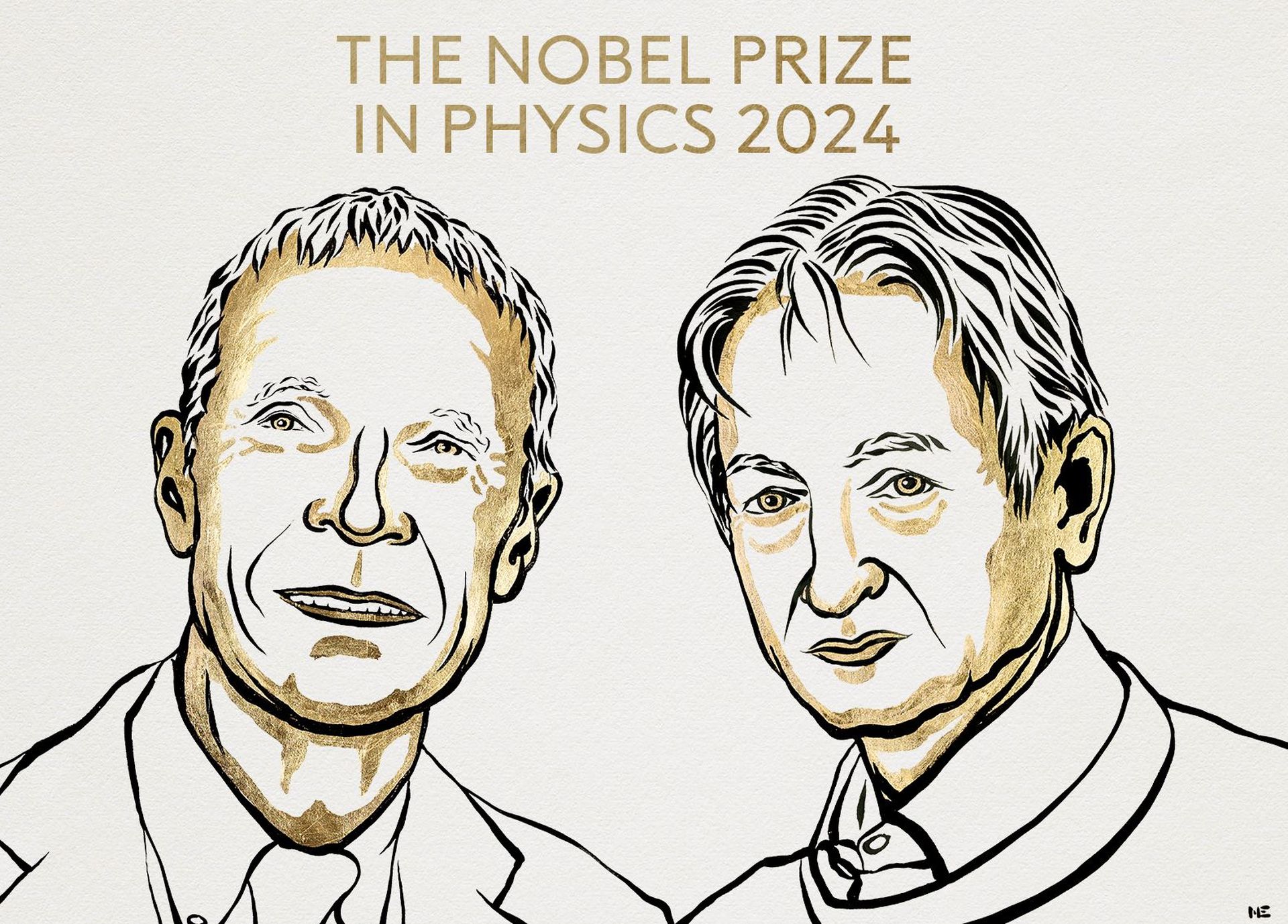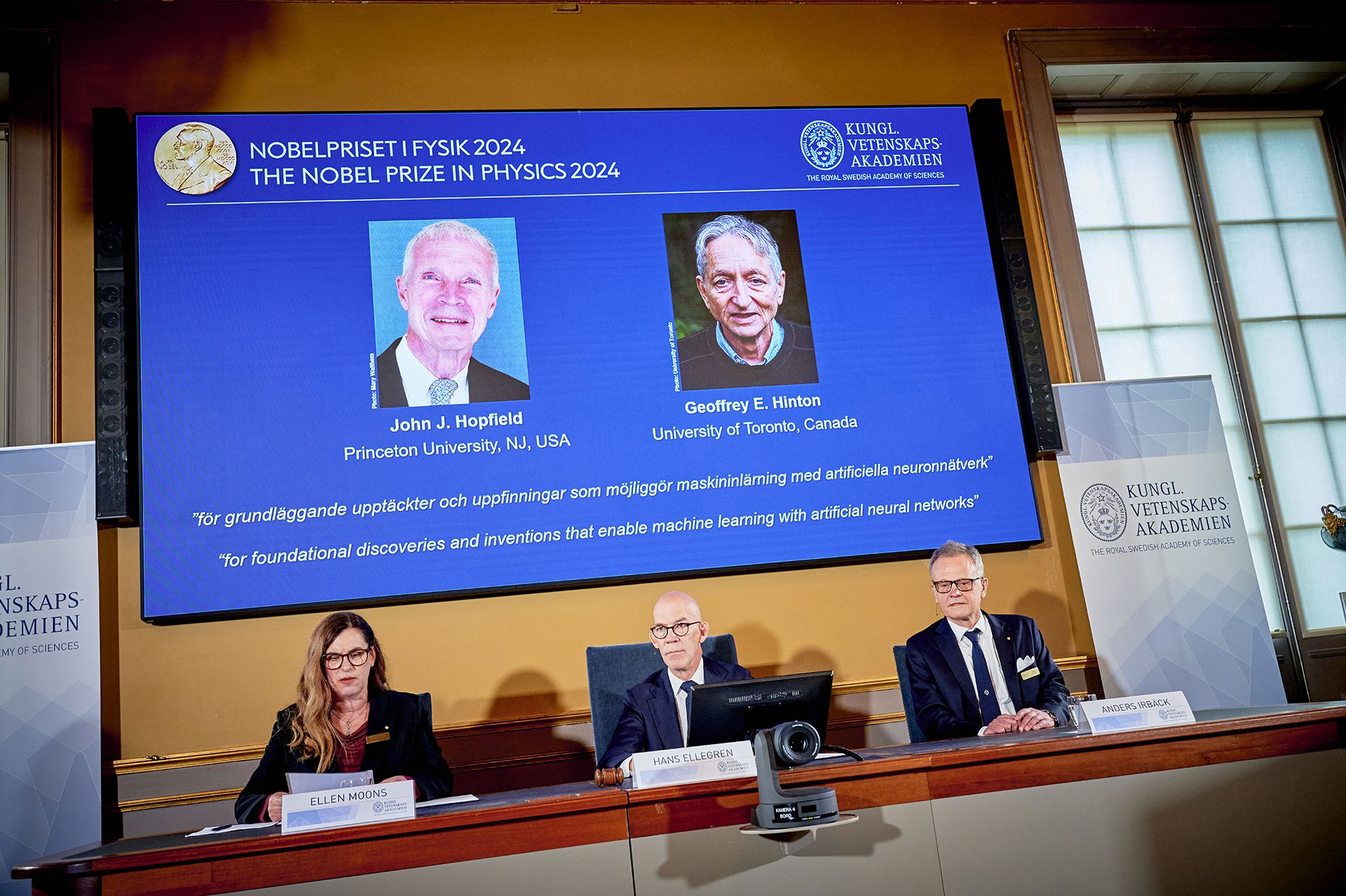AI pioneers John Hopfield and Geoffrey Hinton won Nobel Physics Prize 2024

John Hopfield and Geoffrey Hinton have been awarded the 2024 Nobel Prize in Physics for their pioneering work that laid the foundation for today’s AI revolution.
The prestigious recognition shines a spotlight on the profound scientific contributions of these two visionaries, whose work has transformed both our understanding of artificial intelligence and its impact on everyday life.
John Hopfield, a U.S. scientist and professor at Princeton University, is celebrated for his creation of the associative memory model in 1982. This neural network model mimics the way human brains store and reconstruct information, a concept that is now fundamental to how AI systems process data and images. His work bridged the fields of physics, neuroscience, and computation, making it possible for machines to “learn” by storing patterns and recalling them in ways that resemble human memory.
Meanwhile, Geoffrey Hinton, a British-Canadian computer scientist, is widely regarded as the “godfather of AI” for his breakthroughs in deep learning. Hinton’s work on neural networks enabled computers to recognize patterns and learn from vast amounts of data, an innovation that is now core to applications ranging from speech recognition to image processing. Hinton’s creation of the backpropagation algorithm revolutionized how AI systems learn, and his contributions are deeply embedded in the technologies that power platforms like Google’s search algorithms, autonomous vehicles, and even healthcare diagnostics.
 The 2024 Nobel Prize in Physics is a recognition of their role in revolutionizing machine learning and its global impact (Image credit)
A pivotal moment
The 2024 Nobel Prize in Physics is a recognition of their role in revolutionizing machine learning and its global impact (Image credit)
A pivotal moment
This Nobel Prize comes at a pivotal time in Hinton’s career. In 2023, he made headlines by leaving his role at Google to more freely discuss the potential dangers posed by AI. He has expressed deep concern that artificial intelligence could eventually surpass human intelligence, with unforeseen consequences. “We have no experience of what it’s like to have things smarter than us,” Hinton remarked during the Nobel press conference. While Hinton acknowledges the transformative potential of AI in fields like healthcare, he also warns of the need to prepare for its risks—especially the possibility of AI systems spiraling out of human control.
Hopfield shares a similar sense of caution, reflecting on the dual nature of technological advancement. “One is accustomed to having technologies which are not singularly only good or only bad,” he commented, hinting at the balance society must strike between innovation and responsibility.
Both laureates have dedicated their careers to answering one of humanity’s most profound questions: how can machines exhibit intelligence, and what are the implications of building systems that can potentially outthink their creators? Their contributions have not only laid the groundwork for machine learning but have also spurred wider discussions about ethics, responsibility, and the future role of AI in society.
The Nobel Committee recognized their achievements as a revolution in science and engineering, noting that their innovations are “changing daily life” for people around the globe. The 11 million Swedish crowns ($1.1 million) prize will be shared by Hopfield and Hinton, acknowledging both the technical breakthroughs and the visionary impact of their work.
2024 physics laureate Geoffrey Hinton used a network developed by his co-laureate John Hopfield as the foundation for a new network: the Boltzmann machine. This can learn to recognise characteristic elements in a given type of data.
The Boltzmann machine can be used to classify… pic.twitter.com/LMinR0vA0n
— The Nobel Prize (@NobelPrize) October 8, 2024
History madeThis award also makes the history of the Nobel Prize, which has traditionally honored physicists for discoveries in atomic theory, quantum mechanics, and cosmology.
Awarding the prize to pioneers in AI reflects the increasing intersection of physics, computation, and neuroscience—fields once considered distinct but now deeply intertwined thanks to the efforts of figures like Hopfield and Hinton.
As the future of AI unfolds, the work of these two laureates will continue to shape the direction of the field. Whether it’s unlocking new scientific discoveries, creating smarter healthcare systems, or raising important ethical questions, their legacy will influence how we think about intelligence—both human and machine—for generations to come.
With the Nobel Prize in hand, Hopfield and Hinton have not only secured their place in history but have also ignited further dialogue about the promises and perils of the AI-driven world they helped create.
The question remains: Can humanity guide this powerful technology to ensure it benefits society, or will it become a force that we no longer control? Only time—and continued innovation—will tell.
Featured image credit: Royal Swedish Academy of Sciences
